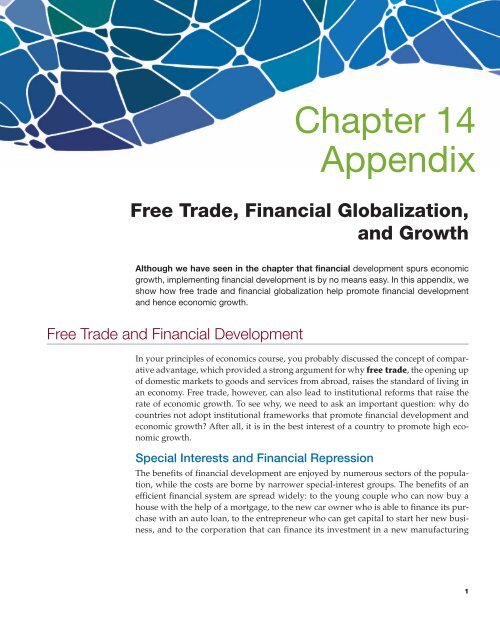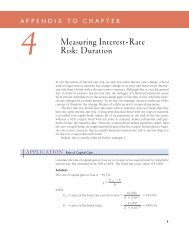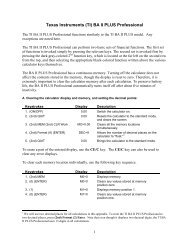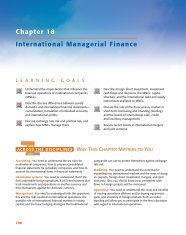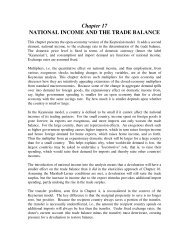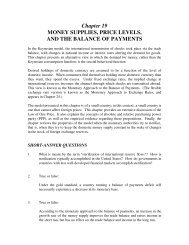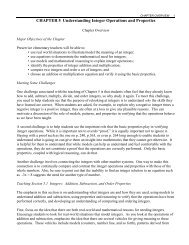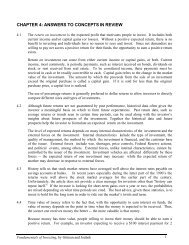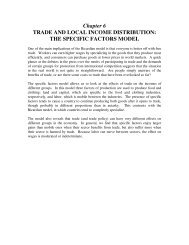Chapter 14 Appendix: Free Trade, Financial Globalization, and Growth
Chapter 14 Appendix: Free Trade, Financial Globalization, and Growth
Chapter 14 Appendix: Free Trade, Financial Globalization, and Growth
You also want an ePaper? Increase the reach of your titles
YUMPU automatically turns print PDFs into web optimized ePapers that Google loves.
<strong>Chapter</strong> <strong>14</strong><br />
<strong>Appendix</strong><br />
<strong>Free</strong> <strong>Trade</strong>, <strong>Financial</strong> <strong>Globalization</strong>,<br />
<strong>and</strong> <strong>Growth</strong><br />
Although we have seen in the chapter that financial development spurs economic<br />
growth, implementing financial development is by no means easy. In this appendix, we<br />
show how free trade <strong>and</strong> financial globalization help promote financial development<br />
<strong>and</strong> hence economic growth.<br />
<strong>Free</strong> <strong>Trade</strong> <strong>and</strong> <strong>Financial</strong> Development<br />
In your principles of economics course, you probably discussed the concept of comparative<br />
advantage, which provided a strong argument for why free trade, the opening up<br />
of domestic markets to goods <strong>and</strong> services from abroad, raises the st<strong>and</strong>ard of living in<br />
an economy. <strong>Free</strong> trade, however, can also lead to institutional reforms that raise the<br />
rate of economic growth. To see why, we need to ask an important question: why do<br />
countries not adopt institutional frameworks that promote financial development <strong>and</strong><br />
economic growth? After all, it is in the best interest of a country to promote high economic<br />
growth.<br />
Special Interests <strong>and</strong> <strong>Financial</strong> Repression<br />
The benefits of financial development are enjoyed by numerous sectors of the population,<br />
while the costs are borne by narrower special-interest groups. The benefits of an<br />
efficient financial system are spread widely: to the young couple who can now buy a<br />
house with the help of a mortgage, to the new car owner who is able to finance its purchase<br />
with an auto loan, to the entrepreneur who can get capital to start her new business,<br />
<strong>and</strong> to the corporation that can finance its investment in a new manufacturing<br />
1
2 CHAPTER <strong>14</strong> APPENDIX<br />
plant. On the other side, there are relatively few, powerful, concentrated special-interest<br />
groups who lose from financial development <strong>and</strong> so try to slow its progress with<br />
financial repression. 1<br />
GOVERNMENT. Government is often the primary source of financial repression.<br />
Although strong property rights are a crucial element in financial development, they<br />
severely constrain a government’s ability to expropriate property <strong>and</strong> ideas whenever it<br />
wants to profit from them. Governments also have strong incentives to establish <strong>and</strong><br />
support state-owned banks through which politicians <strong>and</strong> government officials can<br />
channel funds to themselves, their families, their cronies, <strong>and</strong> businesses that support<br />
their political campaigns.<br />
REPRESSIVE INCUMBENTS. Incumbents, entrenched, rich elites who own businesses<br />
that are threatened by competitive, free markets, also often support financial<br />
repression. 2 Large, established business firms often finance new investment projects<br />
out of their previous earnings <strong>and</strong> so do not need funds from external sources in the<br />
financial markets. Incumbent financial institutions also have incentives to repress the<br />
financial system because they have little to gain from financial development, <strong>and</strong> frequently<br />
have much to lose. A better-developed financial system will allow new businesses<br />
to access funds that will increase competition <strong>and</strong> thus lower the incumbents’<br />
profits. They are therefore likely to oppose institutional reform that promotes financial<br />
development.<br />
How <strong>Free</strong> <strong>Trade</strong> Fosters <strong>Financial</strong> Development <strong>and</strong><br />
Economic <strong>Growth</strong><br />
Allowing entry of foreign goods <strong>and</strong> services into an economy produces a more competitive<br />
environment that will drive down the revenue of incumbent firms <strong>and</strong> reduce<br />
their profits, requiring them to seek out external sources of finance. These sources of<br />
finance will be available only if the financial system has the wherewithal to solve asymmetric<br />
information problems. As a result, incumbent firms <strong>and</strong> their rich, elite owners<br />
will now have incentives to support the necessary institutional reforms to make the<br />
financial system work better. In turn, the resulting reforms will increase the size of the<br />
financial sector <strong>and</strong> will foster economic growth. <strong>Free</strong> trade can therefore be an important<br />
force that stimulates economic growth.<br />
The Evidence: <strong>Free</strong> <strong>Trade</strong> <strong>and</strong> Economic <strong>Growth</strong><br />
A well-known study by Andrew Warner of the Millennium Challenge Corporation <strong>and</strong><br />
Jeffrey Sachs of Columbia University found that developed economies that were open to<br />
trade grew at a 1.6% higher rate than ones that were closed to trade. 3 For developing countries,<br />
the difference was even larger, 3.8%. However, there is a possibility that causation<br />
1For further discussion of why financial repression occurs, see Frederic S. Mishkin, The Next Great<br />
<strong>Globalization</strong>: How Disadvantaged Nations Can Harness Their <strong>Financial</strong> Systems to Get Rich (Princeton, NJ:<br />
Princeton University, 2006).<br />
2Raghuram Rajan <strong>and</strong> Luigi Zingales, Saving Capitalism from the Capitalists: Unleashing the Power of <strong>Financial</strong><br />
Markets to Create Wealth <strong>and</strong> Spread Opportunity (New York: Crown Business, 2003).<br />
3Jeffrey D. Sachs <strong>and</strong> Andrew Warner, “Economic Reform <strong>and</strong> the Process of Global Integration,” Brookings<br />
Papers on Economic Activity (1995): 1–95.
FREE TRADE, FINANCIAL GLOBALIZATION, AND GROWTH 3<br />
might run from faster growth to trade openness, rather than the other way around.<br />
Alternatively, opening up to trade might occur at the same time as other institutional<br />
reforms, <strong>and</strong> these other reforms are what might have stimulated economic growth.<br />
In a later study, Jeffrey Frankel <strong>and</strong> David Romer of the University of California at<br />
Berkeley used geography to help evaluate whether causality actually runs from trade to<br />
higher growth, <strong>and</strong> they found that it does. 4 The location of a country affects the<br />
amount of trade because countries that are isolated geographically (like New Zeal<strong>and</strong>)<br />
or are l<strong>and</strong>locked <strong>and</strong> have very few natural seaports (like Bolivia) have less trade<br />
because transportation costs for goods are higher. These countries have less trade <strong>and</strong><br />
also grow slower than other countries. Because the location of a country is surely<br />
exogenous—where a country is located is not a choice—this evidence suggests that<br />
causality indeed runs from trade to growth. Their study concludes that a rise of one percentage<br />
point in the ratio of trade to GDP raises income per person by one-half of a percentage<br />
point.<br />
In addition, research has linked greater openness to trade to a larger financial sector<br />
<strong>and</strong> the increased competition from foreigners that stimulates domestic firms to become<br />
more productive in order to survive. 5 The evidence is strongly supportive of free trade<br />
being good for economic growth.<br />
<strong>Financial</strong> <strong>Globalization</strong> <strong>and</strong> Economic <strong>Growth</strong><br />
The benefits of globalization of trade in goods <strong>and</strong> services are not a controversial subject<br />
among economists (although they are among the general public). One of the few things<br />
economists agree on is that the globalization of international trade, in which markets are<br />
opened to flows of foreign goods <strong>and</strong> services, is desirable. <strong>Financial</strong> globalization,<br />
the opening of markets to flows of foreign capital (also referred to as capital account<br />
liberalization) is, however, highly controversial even among economists.<br />
<strong>Financial</strong> globalization can encourage financial development <strong>and</strong> economic growth<br />
by directly improving the way financial markets work. Indirectly, as occurs with free<br />
trade, financial globalization changes the distribution of economic power <strong>and</strong> increases<br />
incentives for financial development.<br />
Direct Benefits<br />
When foreign financial institutions enter a country, domestic financial institutions have<br />
to become more efficient in order to survive, which typically happens. 6 Foreign financial<br />
institutions bring “best practices” to domestic financial markets based on expertise<br />
4Jeffrey A. Frankel <strong>and</strong> David Romer, “Does <strong>Trade</strong> Cause <strong>Growth</strong>?” American Economic Review 89 (June 1999):<br />
379–399.<br />
5Raghuram Rajan <strong>and</strong> Luigi Zingales, “The Great Reversals: The Politics of <strong>Financial</strong> Development in the<br />
20th Century,” Journal of <strong>Financial</strong> Economics 69 (2003): 5–50; <strong>and</strong> H. Svalaeryd <strong>and</strong> J. Vlachos, “Market for Risk<br />
<strong>and</strong> Openness to <strong>Trade</strong>: How Are They Related?” Journal of Public Economics 57 (2002): 364–95.<br />
6For example, see Ross Levine, “Foreign Banks, <strong>Financial</strong> Development <strong>and</strong> Economic <strong>Growth</strong>,” in International<br />
<strong>Financial</strong> Markets: Harmonization versus Competition, ed. Claude E. Barfield (Washington, D.C.: AEI Press, 1996); Stijn<br />
Claessens et al., “The Role of Foreign Banks in Domestic Banking Systems,” in The Internationalization of <strong>Financial</strong><br />
Services: Issues <strong>and</strong> Lessons for Developing Countries, eds. Stijn Claessens <strong>and</strong> Marion Jansen (Boston: Kluwer<br />
Academic, 2000); <strong>and</strong> Stijn Claessens, Asli Demirguc-Kunt <strong>and</strong> Harry Huizinga., “How Does Foreign Bank Entry<br />
Affect Domestic Banking Markets,” Journal of Banking <strong>and</strong> Finance 25 (2001): 891–911.
4 CHAPTER <strong>14</strong> APPENDIX<br />
they have gained from their past experience, <strong>and</strong> they are also likely to promote technology<br />
transfer to domestic financial institutions. Entry of foreign financial institutions helps<br />
improve domestic prudential regulation <strong>and</strong> supervision. Government supervisors are<br />
now able to see the risk management practices that have been successfully used in foreign<br />
institutions <strong>and</strong> to insist that they be adopted by domestic institutions.<br />
<strong>Financial</strong> globalization has additional direct benefits for domestic financial markets.<br />
Allowing foreign capital to freely enter domestic financial markets increases the availability<br />
of funds, which in turn increases liquidity <strong>and</strong> lowers the cost of borrowing, stimulating<br />
investment <strong>and</strong> economic growth. This cycle has happened as countries have opened up<br />
their stock markets to foreign capital, as documented in a study by Peter Blair Henry, now<br />
of New York University. On average, dividend yields (the amount of dividends relative to<br />
the price of shares of stock) fall by 2.4 percentage points, the growth rate of investment<br />
increases by 1.1 percentage points, <strong>and</strong> the growth rate of output per worker increases by<br />
2.3 percentage points. These results prompted Henry to state that “the increasingly popular<br />
view that capital account liberalization brings no real benefits seems untenable.” 7<br />
Indirect Benefits<br />
Opening up to foreign capital <strong>and</strong> foreign financial institutions is a strong force for institutional<br />
reforms that promotes financial development. When domestic businesses can<br />
borrow from abroad or from foreign financial institutions that establish affiliates in the<br />
less-developed country, domestic financial institutions will start to lose many of their old<br />
customers. To stay in business, they will have to seek out new customers <strong>and</strong> lend to them<br />
profitably. They will need the information to screen out the good credit risks from the bad<br />
<strong>and</strong> to monitor borrowers to make sure they do not take on excessive risk. Domestic<br />
financial institutions will thus have incentives to encourage politicians to adopt institutional<br />
reforms, such as better accounting st<strong>and</strong>ards <strong>and</strong> disclosure requirements, that will<br />
make it easier for them to acquire the information that they need to make profitable loans.<br />
The institutions will also see the need to improve the legal system so they can enforce<br />
restrictive covenants or be able to take title to collateral if a borrower defaults. With globalization,<br />
domestic financial institutions will support legal reform that will help them<br />
make profits <strong>and</strong> also strengthen the property rights that directly encourage investment.<br />
Will <strong>Financial</strong> <strong>Globalization</strong> Always Work?<br />
Given the benefits of financial globalization, it seems as though opening up domestic<br />
financial markets to international capital should have an unambiguously positive<br />
impact on economic growth <strong>and</strong> the reduction of poverty. However, evidence from<br />
aggregate data on the benefits of financial globalization is mixed: there is no clear-cut<br />
relationship between international financial openness <strong>and</strong> economic growth. 8<br />
7Peter Blair Henry, “Capital Account Liberalization, the Cost of Capital <strong>and</strong> Economic <strong>Growth</strong>,” American<br />
Economic Review 93 (2003): 91–96.<br />
8For example, see the surveys in Ross Levine, “<strong>Financial</strong> Development <strong>and</strong> Economic <strong>Growth</strong>: Views <strong>and</strong><br />
Agenda,” Journal of Economic Literature 35 (1997): 688–672; Barry Eichengreen, “Capital Account<br />
Liberalization: What Do Cross-Country Studies Tell Us?” World Bank Economic Review 15 (2001): 341–365;<br />
Stanley Fischer, “<strong>Globalization</strong> <strong>and</strong> Its Challenges,” American Economic Review 93 (2003): 1–30; Hali J. Edison,<br />
Michael W. Klein, Luca Antonio Ricci, <strong>and</strong> Torsten Slok, “Capital Account Liberalization <strong>and</strong> Economic<br />
Performance: Survey <strong>and</strong> Synthesis,” IMF Staff Papers 51, no. 2 (2004): 26–62; <strong>and</strong> Eswar Prasad, Kenneth<br />
Rogoff, Shang-Jin Wei, <strong>and</strong> M. Ayhan Kose, “Effects of <strong>Financial</strong> <strong>Globalization</strong> on Developing Countries:<br />
Some Empirical Evidence.” International Monetary Fund mimeo. (March 2003).
SUMMARY<br />
FREE TRADE, FINANCIAL GLOBALIZATION, AND GROWTH 5<br />
Why doesn’t opening up financial markets always work? Opening up an economy<br />
to international capital flows, particularly if the transition is not managed to prevent<br />
excessive risk taking, can damage the financial system <strong>and</strong> in turn the economy.<br />
Although financial globalization can be a strong force for good, it can also go very<br />
wrong if a country doesn’t manage the process properly. This riskiness makes financial<br />
globalization very controversial.<br />
1. <strong>Free</strong> trade helps promote financial development <strong>and</strong><br />
economic growth by increasing competition <strong>and</strong><br />
driving down the profits of incumbent firms, requiring<br />
them to seek out external sources of finance.<br />
Incumbent firms will now have incentives to support<br />
the necessary institutional reforms to make the<br />
financial system work better, thereby fostering economic<br />
growth.<br />
KEY TERMS<br />
capital account liberalization,<br />
p. 3<br />
financial globalization, p. 3<br />
financial repression, p. 2<br />
REVIEW QUESTIONS AND PROBLEMS<br />
1. What is financial repression? Why does it occur?<br />
2. Who supports financial repression <strong>and</strong> why?<br />
2. <strong>Financial</strong> globalization can encourage financial development<br />
<strong>and</strong> economic growth by directly improving<br />
the way financial markets work <strong>and</strong> also by changing<br />
the distribution of economic power, thereby increasing<br />
incentives for financial development. <strong>Financial</strong><br />
globalization may not be beneficial if it is not managed<br />
to prevent excessive risk taking, which can damage<br />
the financial system <strong>and</strong> in turn the economy.<br />
free trade, p. 1<br />
3. How does free trade promote financial<br />
development?<br />
4. What are the benefits of financial globalization?


